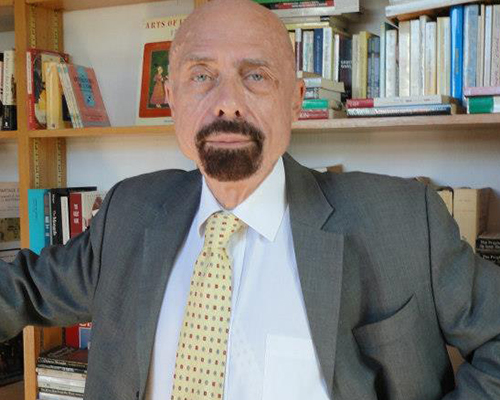Historian and Africa scholar Gérard Prunier despises “empty talk” solutions for Africa, a continent that is expected to grow to 2 billion people by 2050. On the other hand, he is the first to emphasize the complexities of so many regions, countries, and cultures.
“People who say, ‘Africa is like this’ are incorrect,” he said. “I have been in and out of Africa—mostly in—and am still learning.”
What he does know is this: “Africa needs friends. Not supporters or deniers, but friends with open eyes, open hearts, and tough minds.”
During a visit in March, Prunier, a guest instructor for the Keough School of Global Affairs Global Policy Initiative, delivered a statistics-focused lecture titled “African Demography: Long-Term Trends and the Refugee Crisis.” His talk was sponsored by the Kellogg Institute for International Studies and the Keough School.
In explaining Africa’s unprecedented growth, Prunier predicted it ultimately will lead to conflict over resources that will have worldwide repercussions.
“We’re looking at a demographic phenomenon that is unique in the history of the world,” Prunier said. “We have never seen anything like it anywhere else.”
UNPRECEDENTED GROWTH
Prunier gave three reasons for Africa’s skyrocketing population: high birthrates, increasing infant survival rates, and longer adult lifespans.
By contrast, the African population before 1900 was “extremely small,” Prunier said. Only an estimated 100 million people lived on the continent.
“Africa had the population density of Greenland,” he said. But then significant growth began:
- By 1960, Africa’s population stood at 300 million.
- From 1960 to today, population has more than than quadrupled to reach 1.35 billion.
- By 2050, Africa’s population is projected to reach 4 billion.
Prunier explained what American cities would look like if they had experienced similar growth since 1960. Chicago’s population would be 28 million instead of its current 3.5 million, and New York City’s population would be 64 million instead of 8.5 million.
“Nigeria is the size of Texas,” Prunier said. “But in 10 years, it will have a greater population than the entire United States.”
DEVELOPMENT CONCERNS
Population growth means even scarcer resources for a continent that is already struggling with poverty. Prunier listed factors that contribute to these struggles.
- Lack of industry: Africa’s economy largely relies on producing cocoa, coffee, and minerals. Without adequate industry, Africa will not be able to keep up with the rising number of mouths to feed. “With its present rate of growth, it would take 18 years for a country such as Ghana to go from its current per capita income of $675 to $1,300, which is one-seventh of the poorest European country,” Prunier said.
- Underproducing agriculture: Additionally, agriculture in Africa needs to become more efficient, he said, noting disparities between crop and livestock yields between Africa and Europe. A European field, for example, will yield nearly five times as much grain as an African field.
- Intracontinent migration: If it seems that large numbers of people are leaving Africa for other countries, these numbers don’t affect overall population significantly, Prunier said. The bigger issue is migration from country to city. As cities grow, they will be less effective in accommodating new arrivals.
These factors inevitably will create conflict over valuable land and resources, Prunier predicted. “This is the whole point of warfare since prehistoric times,” he explained. “You fight other people for resources, especially if they are scarce.”
LOOKING FORWARD
Prunier isn’t optimistic about solutions to address Africa’s population challenges. A former aid worker in Uganda, he fled the country during conflict in 1972 and became a political refugee in Tanzania. He traveled throughout Eastern Africa for decades.
“I’ve been in Africa for 48 years. I’m married to an African woman, and we have children,” he said. “I care about the place and its people.”
For efforts to be effective, they must be large-scale, he explained. After his lecture, Prunier again identified industrialization as Africa’s best hope.
“What I would like to imagine is that we create some kind of funding process for industrialization,” he said. “People will laugh, but modern economics like banking and computer science are not very useful for Africa. They need industries that use large quantities of manpower. Neither mining nor advanced technology use large-scale manpower.
“In addition Africa needs professional training—try getting a good plumber or electrician in Kinshasa. Too much of the education we foster in Africa is not adapted to the reality of local needs.
“If all this seems radical, I say that radical solutions have to be applied to radical problems.”



